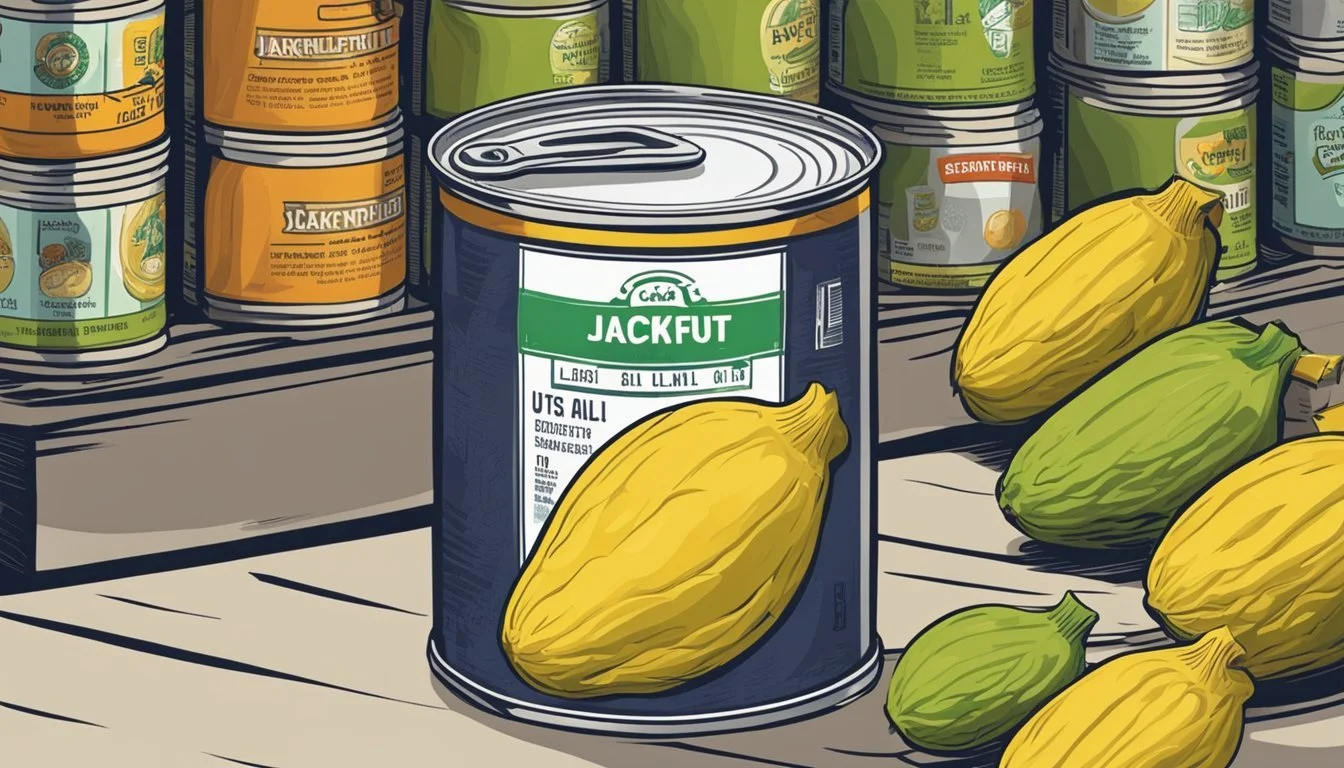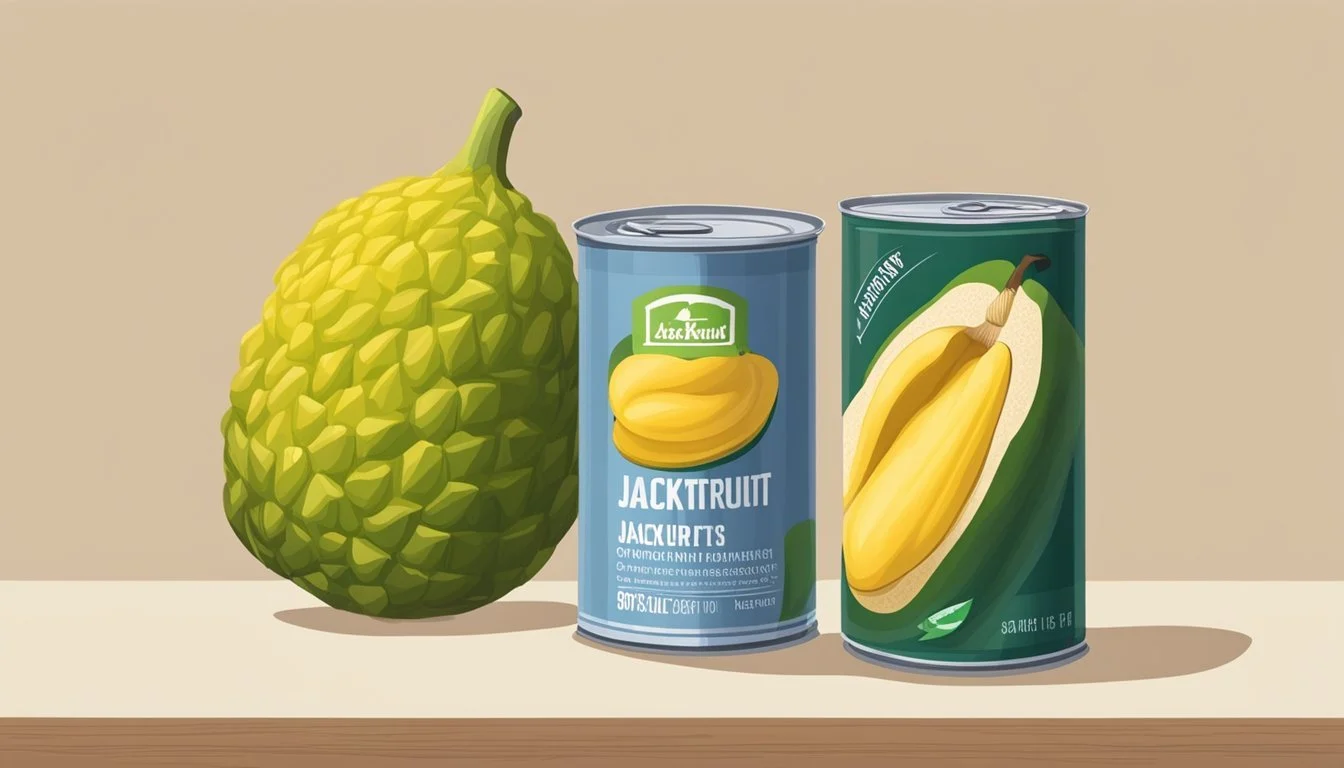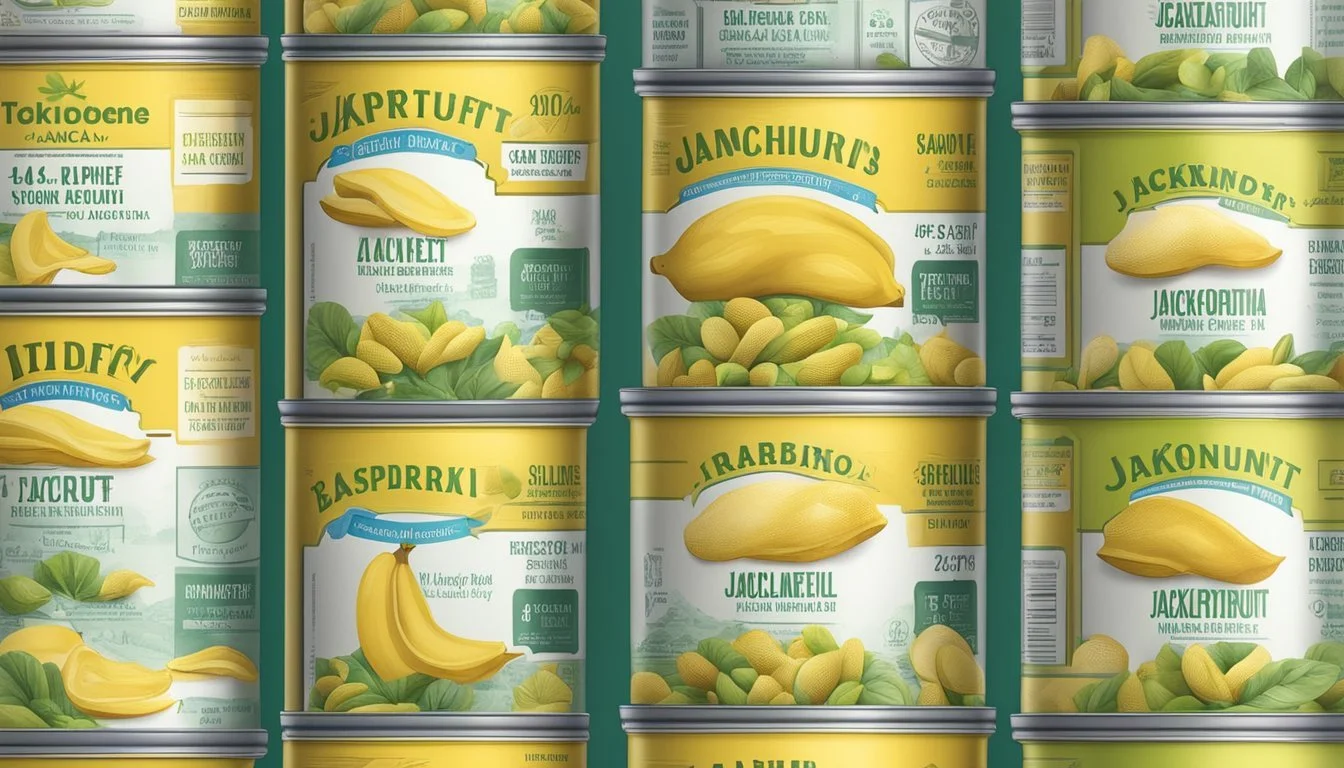How Long Does Canned Jackfruit Last?
Understanding Shelf Life and Storage Tips
Canned jackfruit (how long does canned jackfruit last?) has become a popular ingredient among vegans and those looking to incorporate more plant-based alternatives into their diets. As a versatile tropical fruit that can mimic the texture of meat, it has found its way into many kitchens. Understanding how long it can be stored after purchasing ensures that it remains safe and retains most of its nutritional value for consumption. When unopened and stored in proper conditions, canned low-acid foods like jackfruit can remain safe to eat for two to five years.
Once opened, the shelf life of canned jackfruit changes significantly. It should be transferred to an airtight container if not used immediately and can be expected to last for about three to four days when refrigerated. To maintain its quality and avoid spoilage, it's essential to store the opened jackfruit properly and consume it within this timeframe.
Preserving the integrity of canned goods is also crucial for their longevity. Cans that show signs of bulging, leaking, rusting, or major dents should be discarded, as these symptoms can indicate potential contamination. Proper storage of canned jackfruit in a cool, dry place helps ensure that it remains a safe and delicious addition to meals.
Understanding Canned Jackfruit
When considering the qualities and uses of canned jackfruit, one should recognize its versatility and convenience as a food product, notably as a popular vegan protein substitute.
Nutritional Profile
Canned jackfruit offers a decent nutritional value, often retaining much of the fruit's original vitamins and minerals. The typical canning process ensures that crucial nutrients, such as vitamin C, are preserved. It's a low-calorie option with a high fiber content, essential for a balanced diet.
The Canning Process
The canning process plays a pivotal role in the shelf-life and safety of jackfruit. It usually involves packing the jackfruit in water or brine, which helps in preservation. Using heat to seal the cans, this method also inhibits microbial growth, thereby extending the fruit's usability far beyond what fresh jackfruit can offer.
Canned Jackfruit vs. Fresh Jackfruit
Canned jackfruit tends to be more popular as a vegan and meat alternative due to its texture, which can mimic pulled pork or chicken when cooked. Fresh jackfruit from Asia can be quite large and sweet when ripe, contrasting with the more neutral flavor of canned jackfruit, which is often unripe.
Canned Jackfruit Varieties
Shoppers can find canned jackfruit in various forms at the supermarket, ranging from raw pieces to those marinated for specific recipes like tacos or pulled pork alternatives. Each variety offers a different taste and texture, suitable for diverse cooking methods.
Vegan and Meat Alternatives
For those seeking a meat alternative, canned jackfruit is a compelling option. It's often used in recipes as a plant-based substitute for pork, chicken, or tofu. Its texture allows it to absorb flavors well, making it a versatile ingredient in vegan cooking.
Proper Storage Techniques
Storing canned jackfruit properly is essential to maintaining its quality and extending its shelf life. Appropriate conditions prevent degradation and ensure the fruit remains safe and flavorful for consumption.
Pantry Storage Conditions
The pantry is ideal for unopened canned jackfruit, which thrives in a cool, dry place away from direct sunlight. Temperature stability is key; aim for a range between 50-70°F (10-21°C) to prevent spoilage. Ensure the storage area is free of moisture, which could lead to rust and compromise the can's integrity.
Temperature: Keep between 50-70°F (10-21°C)
Moisture: Store in a dry location to avoid rust
Light: Avoid direct sunlight
Placement: Store upright to minimize denting and potential seam breaches
Refrigerating Canned Jackfruit
Once opened, refrigerate the jackfruit in an airtight container to prevent contamination and spoilage. The syrup or brine should cover the fruit completely to retain flavor and texture; however, transferring the jackfruit and its liquid to a glass or plastic container is recommended, as the metallic taste can transfer to the fruit over time.
Airtight Container: Use glass or plastic to avoid taste transfer
Liquid: Keep the fruit submerged in syrup or brine
Temperature: Maintain a consistent refrigerator temperature below 40°F (4°C)
Freezing for Extended Shelf Life
Freezing opened canned jackfruit can extend its usability beyond refrigeration limits. First, transfer the jackfruit into freezer bags or airtight containers, leaving space for expansion. Vacuum sealing is optimal for preventing freezer burn by removing excess air.
Containers: Opt for freezer bags or airtight containers
Vacuum Seal: Ideal for removing air and preventing freezer burn
Labeling: Mark the date on the package for quality tracking
If properly stored, canned jackfruit can last significantly longer and provide a reliable ingredient for various culinary applications.
Shelf Life and Expiration
Properly stored canned jackfruit remains safe and preserves its quality well beyond its expiration date, thanks to the canning process. Understanding how to determine its shelf life, the effects of storage temperature, and the signs of spoilage is crucial for maintaining food safety.
Determining Expiration and Quality
The expiration date on canned jackfruit serves as a manufacturer's estimate of when the product will start to decline in quality, not when it becomes unsafe. Canned jackfruit typically maintains its quality for 3-4 years from the date of manufacture if unopened and stored properly. To assess quality, one should check for:
No signs of can damage: such as rust, dents, or swelling
Integrity of the seal: ensuring the can's seal has not been compromised
Effects of Temperature on Shelf Life
Temperature plays a significant role in the shelf life of canned jackfruit. It should be stored in a cool, dry place—ideally below 85°F (29°C) and not above 100°F (38°C) as heat can accelerate spoilage. Proper storage conditions lead to optimal shelf life:
Temperature Range Expected Shelf Life Quality Below 85°F (29°C) Maintains good quality Above 100°F (38°C) Quality may diminish rapidly
Signs of Spoilage
Canned jackfruit that has spoiled will exhibit clear signs that should not be ignored. These include:
Odor: An off-smell or any unusual odors emanating from the can indicates spoilage.
Color and Texture Changes: Any visible changes in color or texture upon opening can point to compromised quality.
Can Condition: Rust or leakage suggests moisture entry or can damage, both of which may lead to spoilage.
Consumers should use sensory cues—smell, sight, touch—to detect spoilage and always prioritize food safety when determining the edibility of canned products.
Preparing and Cooking with Canned Jackfruit
Before diving into recipes and cooking techniques, it’s important to understand how to handle canned jackfruit properly and to maximize its culinary potential, whether aiming for a meat substitute or incorporating it into diverse dishes.
Pre-cooking Handling
Canned jackfruit typically comes in brine or syrup and should be drained and rinsed thoroughly to remove excess sodium or sweetness. Using water to rinse the jackfruit can help to wash away any metallic taste from the can. This step ensures the fruit's texture remains optimal and ready for seasoning.
Cooking Methods and Recipes
To achieve a stringy, meat-like texture, jackfruit can be pulled apart before cooking. For a basic recipe, simply heat the fruit with a dash of oil, then add seasoning like smoked paprika (how long does smoked paprika last?) or cumin to imbue a savory profile. Incorporating jackfruit into vegan dishes such as pulled pork sandwiches or burgers can be done by simmering it in BBQ sauce.
Flavor Pairing and Seasoning
When seasoning jackfruit, balance is key. It adapts well to bold flavors like garlic or mango salsa. For a meatier taste, a marinade combining smoked paprika, black beans, and a hint of citrus elevates the dish. Be mindful of the sodium content; jackfruit already absorbs flavors well, so a little goes a long way.
Creating Meat Alternatives
Jackfruit is often celebrated as a meat alternative, especially in vegan cooking. Its stringy texture mimics that of pulled pork. Season well with a combination of spices such as cumin, chili powder, and garlic for a convincing substitute in tacos, sandwiches, and more.
Incorporating into Various Dishes
As a versatile component, jackfruit can enhance various meals, from lunch to dinner. Blend it with tofu in a stir-fry, mix into curries, or partner with yogurt for a creamier dish. Always heat thoroughly to allow the flavors to meld.
Innovative Uses in Cooking
Beyond traditional uses, jackfruit can take center stage in innovative recipes. Its pods and seeds add texture to vegan casseroles, and the flesh can be used as a base for vegan desserts. Experiment with jackfruit in place of meat for meal prep or quick dinners, trying it with ingredients like banana for a sweet twist or black beans for added protein.
Health and Nutrition
Canned jackfruit, while convenient, retains the essential nutrients characteristic of the tropical fruit, making it a robust item in terms of health and nutrition for those considering it as part of their diet.
Nutritional Benefits
Canned jackfruit is a source of various vitamins and minerals, while also providing a modest amount of protein which can be beneficial for those following a vegan diet. A serving typically contains:
Vitamin C: Essential for immune function
Potassium: Vital for heart health and muscle function
Dietary Fiber: Aids in digestion and may help regulate blood sugar levels
Dietary Considerations
While canned jackfruit contributes several nutrients, it is a low-protein food compared to animal products and more protein-rich vegan alternatives. However, its high fiber and nutrient content align well with whole-food plant-based diets. It should be noted that the sodium content in canned jackfruit may be higher than its fresh counterpart due to the canning process. Always check labels for specific nutritional values.
Allergies and Sensitivities
Though rare, allergies to jackfruit can occur. Individuals with latex fruit allergy syndrome may be susceptible, as jackfruit contains similar proteins to those causing reactions in this condition. In terms of food safety, canned jackfruit, when stored and handled properly, is a low-risk food, but any signs of can damage or spoilage should be heeded to avoid potential foodborne illness.
Conclusion
Canned jackfruit provides a practical, nutritious option for those looking to enjoy this fruit out of season. When stored in a cool, dry, and dark location, commercially canned jackfruit maintains its best quality for approximately 12 to 18 months. Home-canned jackfruit's optimal quality lasts for about a year. Following these guidelines ensures that consumers benefit from both the flavor and nutritional value of the fruit.
Once opened, jackfruit should be placed in an airtight food storage container and refrigerated for safety. It remains suitable for consumption within 3 to 4 days under these conditions. The use of canned jackfruit in various recipes offers a convenient alternative to fresh fruit, particularly for individuals adopting a meatless diet or aiming to incorporate plant-based options.
Here are key points to remember:
Best Quality Shelf Life:
Commercially canned: 12-18 months
Home-canned: Up to 1 year
After Opening:
Place in an airtight container
Refrigerate immediately
Consume within 3-4 days
In summary, the shelf life of canned fruit like jackfruit extends significantly beyond the date printed on the can. Temperature and storage conditions play a crucial role in preservation. The article reinforces the value of canned jackfruit as a durable, convenient food source, while emphasizing the importance of proper storage before and after opening to maximize shelf life.
FAQs
In this section, readers will find answers to frequently asked questions about the shelf life, storage, and usage of canned jackfruit.
Common Questions about Canned Jackfruit
How long does canned jackfruit last?
Canned jackfruit is known for its lasting freshness, with an unopened can retaining its best quality for 12-18 months. It's important to note that while the flavor profile and vitamin content may diminish over time, the protein, carbohydrate, and mineral content remain stable.
What is the shelf life of an opened can of jackfruit?
After opening, jackfruit should be transferred to an airtight container and can be refrigerated for 1-2 days. For longer storage, it can be kept in the freezer, where it will last for up to 1 month.
How can one tell if canned jackfruit has gone bad?
They should check for any signs of spoilage such as an unusual odor, discoloration, or mold. If the can is leaking, rusted, bulging, or severely dented, it’s best to discard it.
Can ripe jackfruit be frozen for later use?
Yes, ripe jackfruit can be frozen. One should place the jackfruit pieces in freezer-safe bags or containers, squeezing out excess air to avoid freezer burn. Labeling with the current date ensures proper rotation and usage.
Does freezing affect the taste of canned jackfruit used in recipes?
Freezing may alter the texture slightly, but generally, frozen canned jackfruit can still be used in recipes without noticeable difference in flavor, especially in cooked dishes.
How does the expiration date affect the storage of canned jackfruit?
The expiration date, or “best by” date, indicates peak quality as determined by the manufacturer. Canned jackfruit can be safe to consume beyond this date if the can remains intact and properly stored, but quality may not be at its best.
What is the best way to store canned jackfruit after opening?
One should store the opened jackfruit in an airtight container in the refrigerator and use it within a couple of days, or freeze it immediately for extended use.
Are there any specific storage tips to ensure canned jackfruit lasts longer?
A cool, dark pantry is ideal for storing unopened canned jackfruit. Avoid exposure to extreme temperatures, and ensure the storage area is dry to prevent can corrosion.
Can canned jackfruit be cooked directly from the can?
Canned jackfruit is often precooked and can be used directly from the can, making it a convenient ingredient for quick recipes. It is advisable to drain and rinse it before use.







